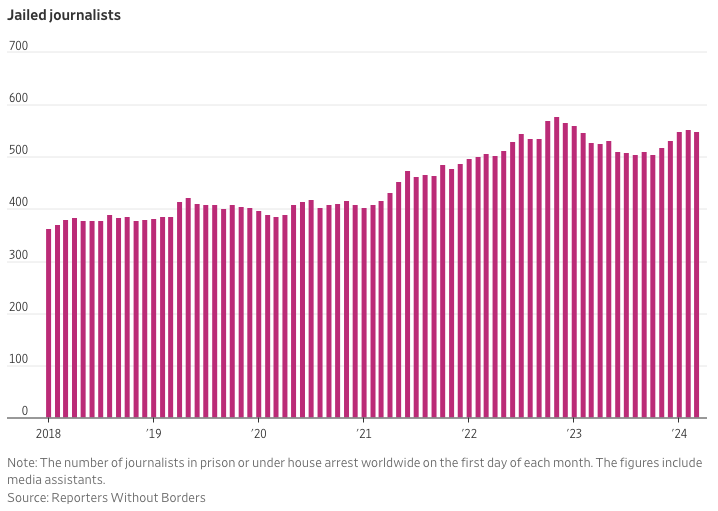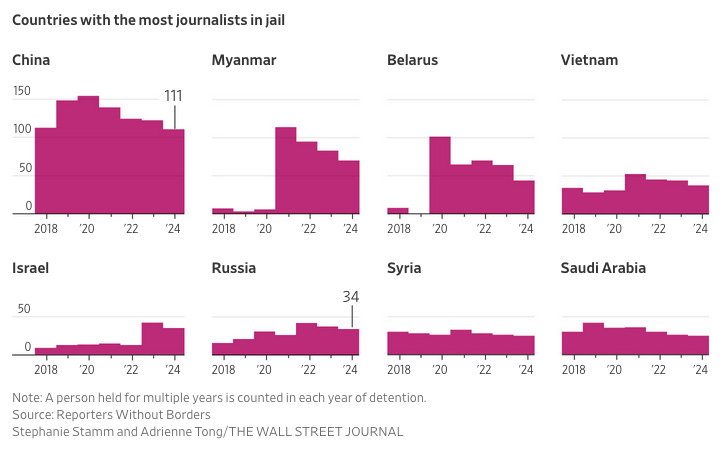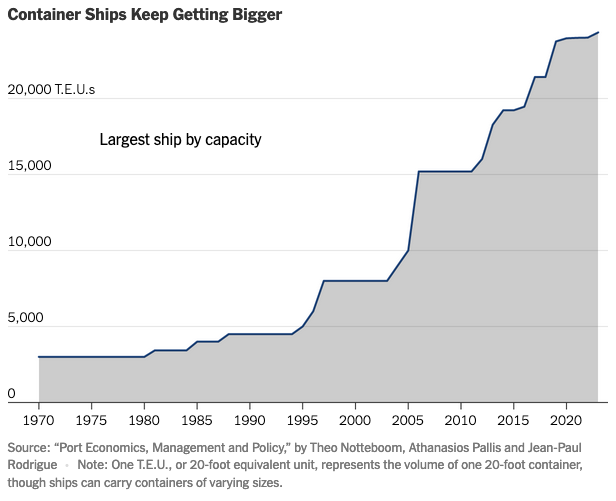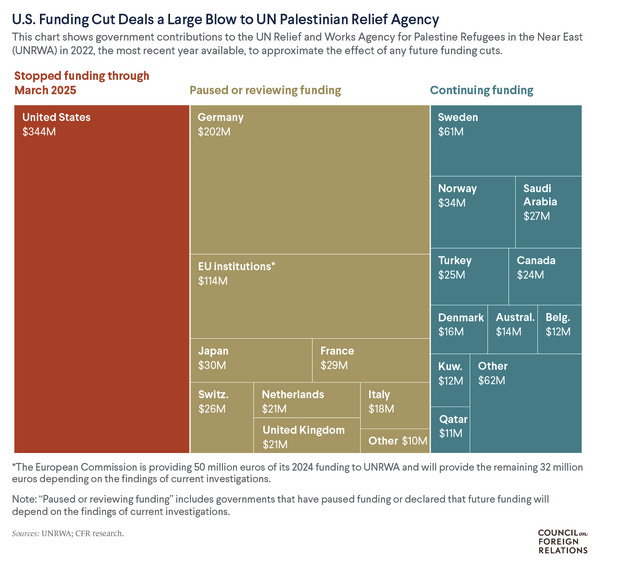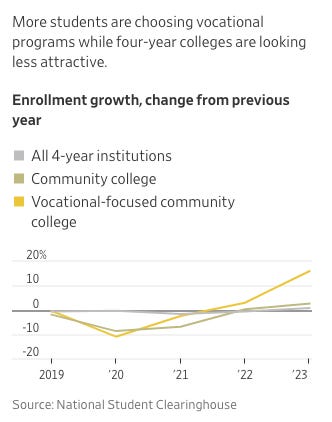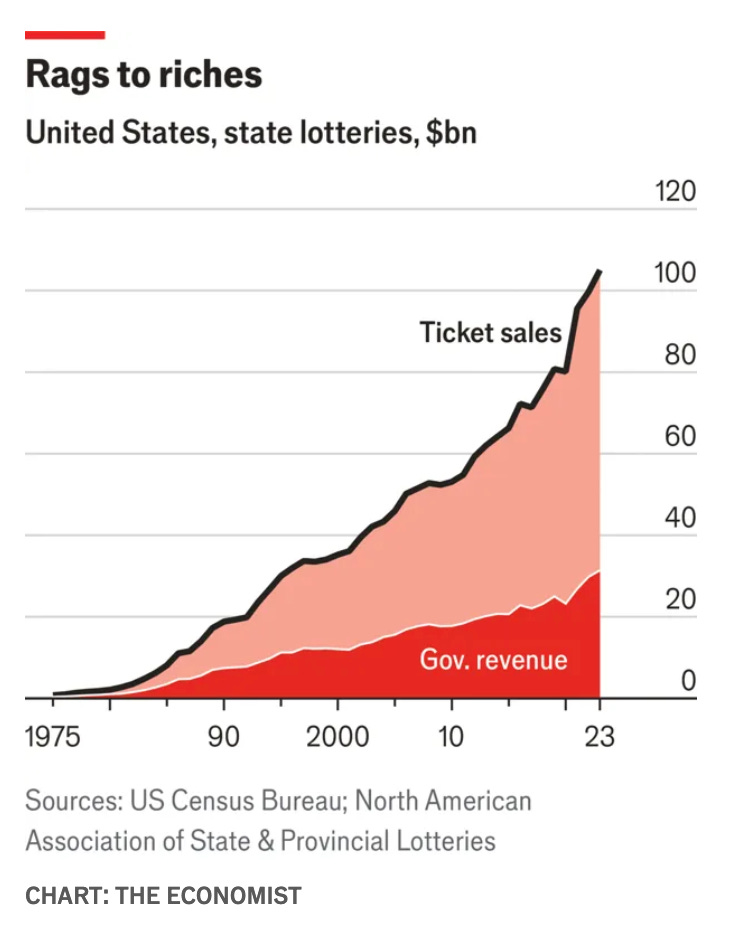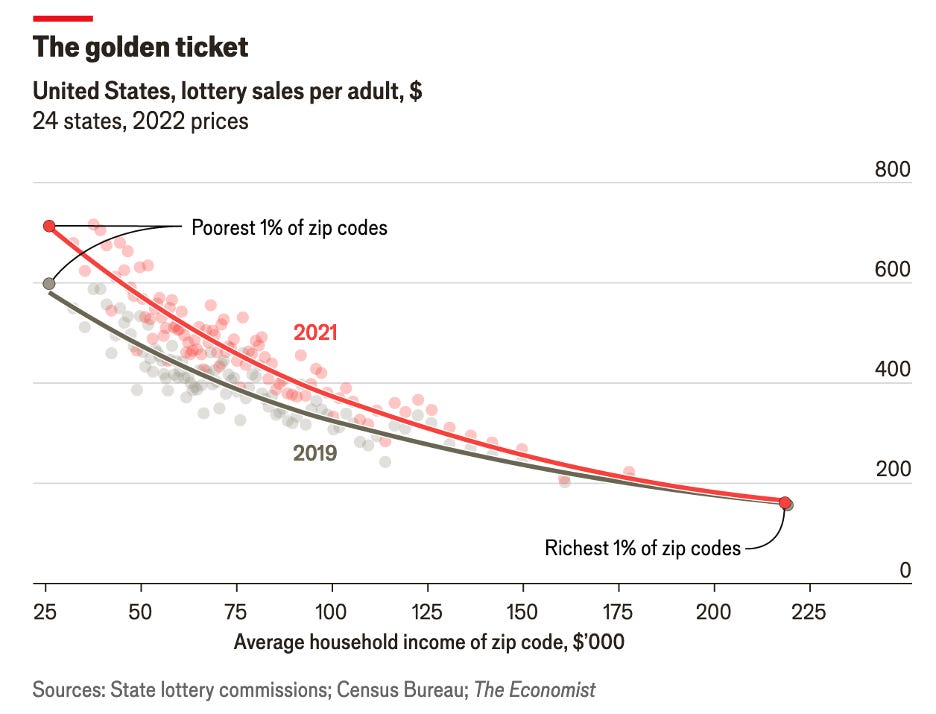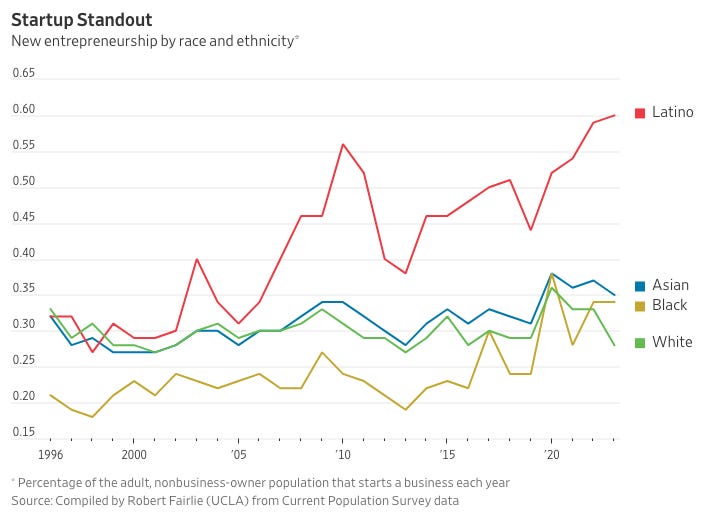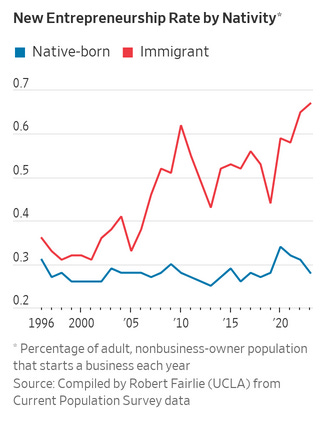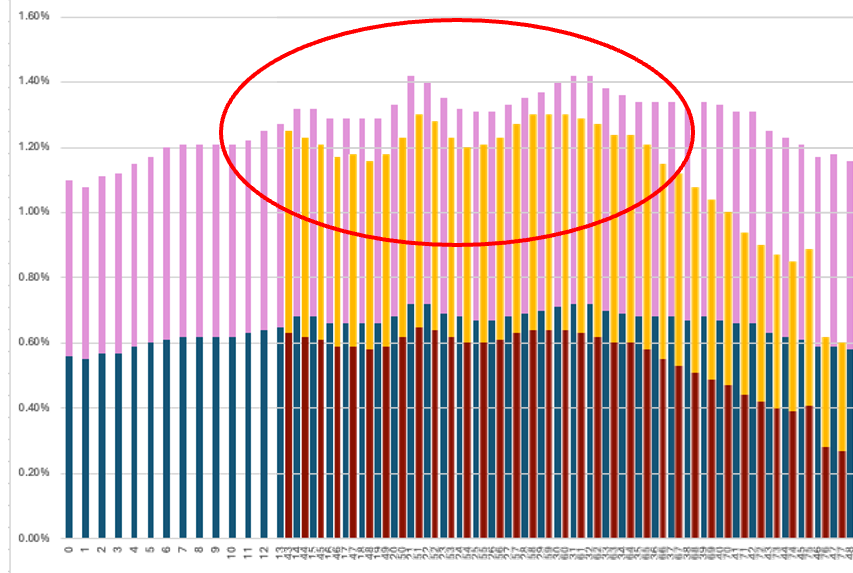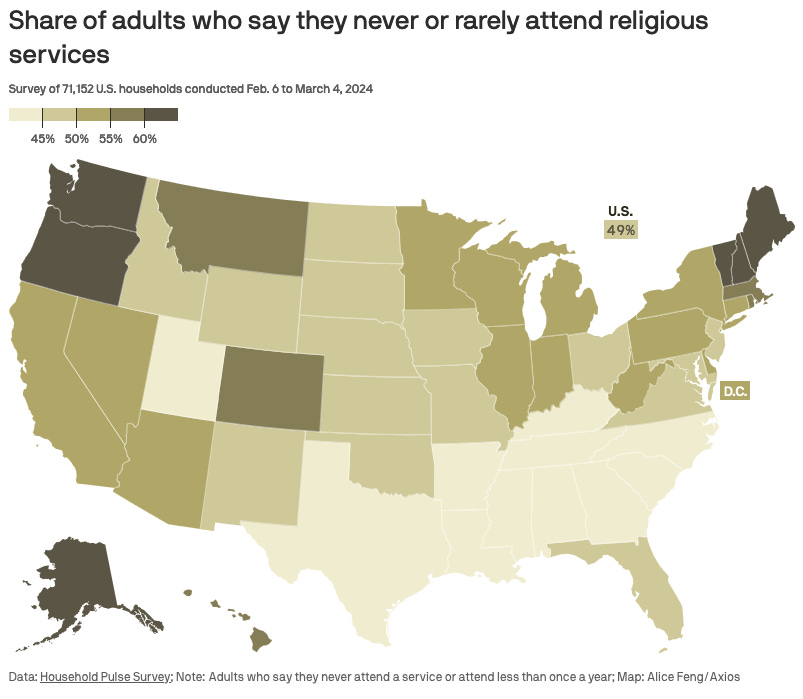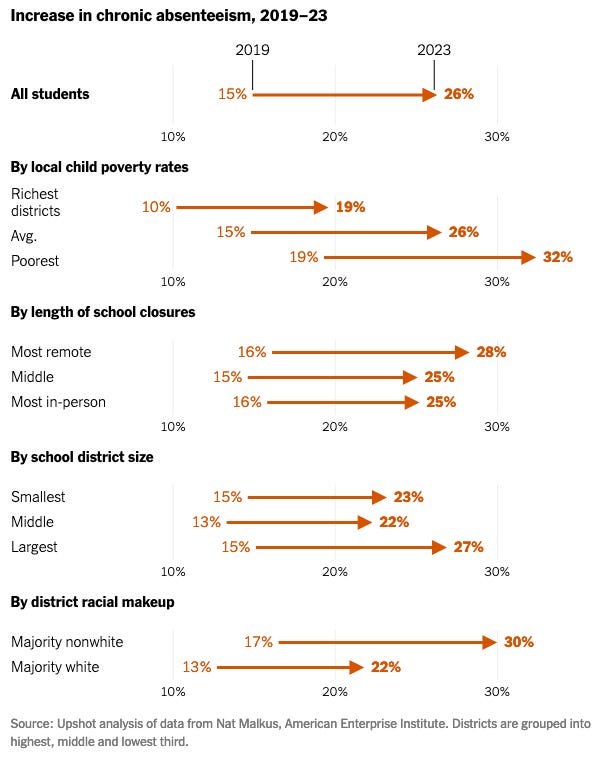👋 Hello Reader, I hope you had a great week.
Sorry for the lack of newsletter last week—I was spending some time with family, as was my assistant editor (yes, I have one of those now to help with the workload). There were simply too many articles to try to include over the past two weeks, so instead, here are those that rose to the very top—some simply informative (an increase in boat sizes), some very thought provoking (an increase in euthanasia), and many in between.
Also, along the lines of critical thinking, I ran across these two articles, though dated, that we should all keep in mind when looking at our news feeds and things we find on the internet:
Nearly All of Wikipedia Is Written By Just 1 Percent of Its Editors (Vice)
10 percent of Twitter users create 80 percent of tweets, study finds (Poynter)
THE QUICK SHOT 🚀
A supercharged summary of summaries
A lock icon (🔒) indicates articles behind a paywall, and a chart icon (📊) indicates an informative chart/graphic in “Slow Brew.”
World
North America
Biden administration finalizes first demographics data standards update in nearly 30 years (GovExec)
These Eight U.S. Bridges Are Vulnerable to a Repeat of the Baltimore Crash (WSJ🔒)📊
A Look at Washington State’s ‘Strippers’ Bill of Rights’ (NYT🔒)
What’s the matter with Canada? (Noahpinion)📊
Europe
Middle East
Netanyahu Says Israel Will Shut Down Al Jazeera in Israel (NYT🔒)
Arab Nations Balk at Funding U.N. Aid Agency Vital to Palestinians (WSJ🔒)
The UN’s Palestinian Aid Controversy: What’s at Stake (CFR)📊
Israel dismisses 2 officers over deadly drone strikes on aid workers in Gaza (AP)
Turkey’s Erdoğan suffers blow in crucial mayoral elections as secular opposition surges (Politico)
Asia-Pacific
IS-K: Who are the Islamic State jihadists behind Moscow attack? (BBC)
Why is Taiwan so exposed to earthquakes and so well prepared to withstand them? (AP)
Government
Who is Nicole Shanahan, Robert F. Kennedy Jr.’s vice presidential pick? (CNN)
How the No Labels 2024 Presidential Campaign Failed to Launch (WSJ🔒)
Defense
Last survivor of USS Arizona dies at 102 (Military Times)
Congress to USAF: Not So Fast on Your Reorg Plans (Air & Space Forces)
Economy
The truth about the Biden economy (Slow Boring)
The economics of American lotteries (Economist🔒)📊
Business
Visa, Mastercard Agree to Lower Swipe Fees, Settling Long-Running Lawsuit (WSJ🔒)
Latinos Are Starting U.S. Businesses at a Torrid Pace (WSJ🔒)📊
One CEO’s Radical Fix for Corporate Troubles: Purge the Bosses (WSJ🔒)
Amazon's Just Walk Out technology relies on hundreds of workers in India watching you shop (MSN)
Crypto
Real Estate
DeSantis eliminates 'squatters' rights' in Florida, gives power to cops to remove offenders (Yahoo News)
Engineering
Cyber
Florida’s DeSantis signs one of the country’s most restrictive social media bans for minors (AP)
Debate: Should the U.S. Ban TikTok? (The Flip Side)
To combat bullying and extremism, Air Force Academy turns to social media sleuthing (USA Today)
Google Pledges to Destroy Browsing Data to Settle ‘Incognito’ Lawsuit (WSJ🔒)
AT&T Reset 7.6 Million Customers’ Passcodes After Data Breach (WSJ🔒)
The Audacious MGM Hack That Brought Chaos to Las Vegas (WSJ🔒)
Artificial Intelligence
.AI Domains: So Hot Right Now (Chartr) 📊
Life
'I’m 28. And I’m Scheduled to Die in May.' (The Flip Side)
Opinion | The perverse incentives of euthanasia (Noahpinion)
Religion
Religious service attendance, mapped (Axios)📊
Education
Food & Drink
New $20 minimum wage for fast food workers in California is set to start Monday (AP)
Why the French are drinking less wine (Economist🔒)
Nature
Billions of cicadas will buzz this spring as two broods emerge at the same time (NPR)
Wait, does America suddenly have a record number of bees? (WP🔒)
Entertainment
The Ultimate 432Hz VS 440Hz | CONSPIRACY + Comparison (YouTube)
Music Lyrics Have Gotten Simpler, Angrier And More Repetitive Since The 1980s, Study Finds (Forbes🔒)
Sports
Caitlin Clark Adds Another Record to Her College Basketball Résumé (WSJ🔒)
All 10 skaters brawl off opening faceoff at start of Devils-Rangers game (AP )
Jasmin Paris Becomes First Woman to Complete Extreme Barkley Race (NYT🔒)
For Fun
THE SLOW BREW ☕
A more relaxed approach to the summaries.
World
Authoritarians Threaten Journalists Around the Globe (WSJ🔒)
The surge in government crackdowns on the press, which accelerated after Russia invaded Ukraine two years ago, has left more than 520 journalists imprisoned worldwide, including a few dozen under house arrest, according to the Paris-based advocacy group Reporters Without Borders. The figure is among the highest the group has ever recorded. The crackdowns reverse an expansion of media freedom that began after the end of the Cold War, as many governments turn toward autocracy. Even places that were once bastions of the free press, such as Hong Kong, are tightening restrictions on journalists. And countries such as Russia that once tolerated some dissent are imposing near-totalitarian limits on independent journalism, leaving state media and government propaganda to fill the void.
North America
Biden administration finalizes first demographics data standards update in nearly 30 years (GovExec)
So what’s changing? For one, the government will no longer ask separate questions regarding a respondent’s race and ethnicity, instead incorporating “Hispanic or Latino” as part of the core list of “race and/or ethnicity” categories. Splitting survey responses regarding people’s race and ethnicities had become a headache for agencies and respondents alike, OMB wrote. And a new addition to the list of races and ethnicities available for self-reporting in surveys and on government forms is “Middle Eastern or North African.” Previously considered part of the “White” reporting category, the 1997 standards have become out of sync with how most Middle Eastern or North African respondents viewed their own racial or ethnic identity. Additionally, OMB is updating the actual wording of questions on race and ethnicity to better encourage respondents to select multiple categories if they come from a multiracial or multicultural background. And it is removing a number of antiquated phrases from the definitions of the main categories, such as “Negro” from the Black or African American definition, “Far East” from the Asian definition, as well as “who maintain tribal affiliation or community attachment” from the definition for American Indian or Alaska Native.
The Dali Is a Big Ship. But Not the Biggest. (NYT🔒)
The container ship that hit the Francis Scott Key Bridge early Tuesday while leaving Baltimore Harbor is enormous. When fully loaded, the vessel, the Dali, can weigh more than 116,000 tons and carry thousands of containers of cargo. But in comparison with some of the other ships out there, the Dali is a featherweight. The size of the largest container ships has grown, in fits and starts, since the early 1980s. The current largest class of container ships in the world can hold more than twice the amount of cargo that the Dali can.
These Eight U.S. Bridges Are Vulnerable to a Repeat of the Baltimore Crash (WSJ🔒)
Fewer than 10 bridges in the U.S. have the clearance of the Francis Scott Key Bridge in Baltimore, the 1,200-foot span that collapsed after a supersize containership slammed into one of its vertical supports. All of them have a vulnerability where the failure of even a single steel component in tension along the span could cause a collapse. The National Transportation Safety Board flagged this condition in the Key Bridge after it fell early Tuesday morning—but the hit that destroyed the Key wasn’t a blow to one of those crucial steel components. Rather, it was the devastating strike taking out one of the bridge’s concrete vertical supports, known as a pier, that caused the massive structure to cascade into the water below.
A Look at Washington State’s ‘Strippers’ Bill of Rights’ (NYT🔒)
Strippers face many risks at work, including sexual harassment, abuse, violence, discrimination and injuries resulting from the physical work of dancing for hours. Under the new law, club or establishment employees must undergo training aimed at preventing sexual harassment, identifying and reporting human trafficking and learning how to de-escalate conflicts and provide first aid. The law also requires adult entertainment establishments to have security workers on site and keypad codes for dressing rooms as well as working panic buttons within reach of dancers in private rooms where they are alone with customers. Also, clubs must prove that they are keeping lists of customers who’ve been banned to keep dancers safe. Additionally, the law eliminates “back rent,” which is debt that accumulates when dancers do not make enough money to pay their customary “stage rental fee,” or house fees, for the night. The law also limits the amount that establishments can charge dancers. Beth Ross, a lawyer in California who litigated a 1994 class-action suit against the Mitchell Brothers O’Farrell Theater, then a well-known San Francisco strip club, said that she did not see any obvious legal challenges that would invalidate the new law. However, she emphasized, “Really the question is how will this law be enforced?” “Is this a really good set of ideas on paper, or is this a law that has teeth that will be of genuine benefit to the women who do this very dangerous legal type of work?” she said. Ms. Ross said she believed that the law was unlikely to be challenged because of the path it creates for strip clubs to sell alcohol. “The ability to serve alcohol in these clubs is something that these clubs have wanted forever,” she said.
What’s the matter with Canada? (Noahpinion)
Many people are worried about Canada’s economy in recent months. The country’s real per capita GDP — the most common measure of living standards — has been falling for over a year now. What’s going on with Canada’s economy? It’s not clear. A drop in exports was part of the most recent quarterly weakness, driven by oil and cars. That illustrates Canada’s dangerous dependence on petroleum — both its reliance on oil exports, and its status as a hub for internal combustion car manufacturing in an era when everyone is switching to electric. Oil also helps explain the stagnation of Canadian GDP since 2014; that’s when oil prices fell from their very high early 2010s plateau. “Petrostate” is not an economic strategy that Canada should pursue. But Canadian consumption and investment are also stagnant or falling right now. This could reflect the effect of higher interest rates, though it’s not clear why that would affect Canada more than the United States (both countries are running large fiscal deficits). It could also reflect diminished expectations about Canadian oil and car exports going forward. Another long-term problem, which Tyler mentions, is Canada’s dysfunctional housing market and refusal to build new housing supply.
Europe
Scotland’s new Hate Crime Act is fraught with danger (Spectator)
The Hate Crime and Public Order (Scotland) Act was passed three years ago, but it has been delayed as the authorities prepare for what’s to come. It finally takes effect from 1 April. The offence of ‘stirring up racial hatred’ will be extended to disability, religion, sexual orientation, age, transgender identity and ‘variations in sex characteristics’. Scotland’s ancient blasphemy law, last invoked in 1843, is abolished by the Act. But with the extension of ‘stirring up’, a modern blasphemy code is being put in its place. The new law gives few assurances for protecting freedom of speech: there’s a small caveat for religion, but not for what have become known as gender-critical beliefs. Those who campaign against gender self-ID fear they will soon be reported to the police. Joanna Cherry KC, a Scottish Nationalist MP, has said she has ‘no doubt’ that the law ‘will be weaponised by trans rights activists to try to silence, and worse still, criminalise women who do not share their beliefs’. The law doesn’t just apply to social media posts or newspaper articles. It covers anything said anywhere – even in your own home. Children will in theory be able to report their parents. Scots can inform on each other anonymously, through an expanded network of ‘third-party reporting centres’.
Middle East
Netanyahu Says Israel Will Shut Down Al Jazeera in Israel (NYT🔒)
Israeli lawmakers passed a law on Monday allowing the government to temporarily shutter foreign media outlets that Prime Minister Benjamin Netanyahu has determined undermine the country’s national security, and the Israeli leader said he would use the new law to block Al Jazeera broadcasts and activities in Israel.
Arab Nations Balk at Funding U.N. Aid Agency Vital to Palestinians (WSJ🔒)
About a week after the U.S. and other Western countries froze funding to a U.N. agency for Palestinian refugees called Unrwa in late January, its top official flew to the Arab Gulf, hoping wealthy Arab monarchies would save the organization at a time when it is the main provider of humanitarian aid in Gaza. The effort came up lacking. Philippe Lazzarini, the head of the U.N. Relief and Works Agency, raised $85 million from Saudi Arabia, Qatar and the United Arab Emirates for 2024, far short of the funding lost when the U.S. and others cut off aid following allegations that at least a dozen agency employees took part in the Oct. 7 attacks on Israel. Last year, the U.S. alone gave the agency more than $422 million.
NOTE: More here:
The UN’s Palestinian Aid Controversy: What’s at Stake (CFR)
Israel dismisses 2 officers over deadly drone strikes on aid workers in Gaza (AP)
The Israeli military said Friday that it has dismissed two officers and reprimanded three others for their roles in drone strikes in Gaza that killed seven aid workers on a food-delivery mission, saying they had mishandled critical information and violated the army’s rules of engagement. The findings of a retired general’s investigation into the Monday killings marked an embarrassing admission by Israel, which faces growing accusations from key allies, including the U.S., of not doing enough to protect Gaza’s civilians from its war with Hamas. The findings are likely to renew skepticism over the Israeli military’s decision-making. Palestinians, aid groups and human rights organizations have repeatedly accused Israeli forces of firing recklessly at civilians throughout the conflict — a charge Israel denies.
Turkey’s Erdoğan suffers blow in crucial mayoral elections as secular opposition surges (Politico)
Turkey’s President Recep Tayyip Erdoğan suffered a major blow on Sunday, with initial results showing the country’s main opposition party notched up regional election victories around the country. The opposition Republican People’s Party (CHP) held onto or captured the country’s five biggest cities in Sunday’s vote, which had been seen as a make-or-break moment for a movement still reeling from Erdoğan’s victory in the Turkish presidential contest in May 2023. The CHP saw its biggest triumph in Istanbul, where Ekrem Imamoğlu was reelected mayor. Europe’s biggest city, Istanbul accounts for 18 percent of Turkey’s population and a third of its economy.
Asia-Pacific
IS-K: Who are the Islamic State jihadists behind Moscow attack? (BBC)
Despite attempts by President Vladimir Putin and Russia's state-controlled media to pin the blame for Friday's deadly Moscow theatre attack on Ukraine, more details are emerging about the jihadist group IS-K that has claimed it was behind it. IS-K is an abbreviation of Islamic State-Khorasan - a regional affiliate of the Islamic State group, which has been proscribed as a terror organisation by governments across the world. It is focused on Afghanistan, Iran and Pakistan and into Central Asia. The group has given itself the name Khorasan as that was part of an historic Islamic caliphate spanning that region. IS-K has been around for nine years but in recent months it has emerged as the most dangerous branch of the Islamic State group, with a long reach and a reputation for extreme brutality and cruelty. According to Russian state media the four men captured and charged are all Tajiks from the Central Asian republic of Tajikistan, which used to be part of the Soviet Union. IS-K consider most of the world to be their enemies. Russia is high up on their list, along with the US, Europe, Israel, Jews, Christians, Shia Muslims, the Taliban and all rulers of Muslim-majority states, who they consider to be "apostates". Islamic State's hostility to Russia goes back to the Chechen wars in the 1990s and early 2000s, when Moscow's forces devastated the Chechen capital Grozny.
Why is Taiwan so exposed to earthquakes and so well prepared to withstand them? (AP News)Top of Form
Taiwan was struck Wednesday by its most powerful earthquake in a quarter of a century. At least nine people were killed and hundreds injured, buildings and highways damaged and dozens of workers at quarries stranded. Taiwan is no stranger to powerful earthquakes yet their toll on the high-tech island’s 23 million residents has been relatively contained thanks to its excellent earthquake preparedness, experts say. Here is a closer look at Taiwan’s history of earthquakes.
Government
How the No Labels 2024 Presidential Campaign Failed to Launch (WSJ)
It was the presidential nomination that ultimately no one wanted. No Labels, the centrist group which has sought to field a third-party presidential bid, is abandoning efforts to create a “unity ticket” aiming to win the White House, the organization announced Thursday.
Who is Nicole Shanahan, Robert F. Kennedy Jr.’s vice presidential pick? (CNN)
Independent presidential candidate Robert F. Kennedy Jr. named Silicon Valley attorney and entrepreneur Nicole Shanahan as his vice presidential pick at a campaign rally Tuesday in her hometown of Oakland, California. The 38-year-old, first-time candidate enters the race largely unknown to the public outside of tech circles but was an early supporter of Kennedy’s presidential bid, backing him last year while he was still running in the Democratic primary.
Defense
Last survivor of USS Arizona dies at 102 (Military Times)
The sole survivor serving aboard the USS Arizona during the Japanese attack on Pearl Harbor has died.
Congress to USAF: Not So Fast on Your Reorg Plans (Air & Space Forces)
The Department of the Air Force’s plans to “reoptimize for great power competition” are meeting with skepticism in Congress, and lawmakers want more details before changes go into effect. Congress wants more detail from the Air Force and a six-month review on how its plans were developed, requirements included in the 2024 spending bill that passed the House and Senate March 22 and 23. Air Force Secretary Frank Kendall and his leadership team unveiled a sweeping 24-point plan to “re-optimize for great power competition” at the AFA Warfare Symposium Feb. 12, and leaders have been talking up the overhaul ever since.
Economy
How Gen Z Is Becoming the Toolbelt Generation (WSJ🔒)
More young workers are going into trades as disenchantment with the college track continues, and rising pay and new technologies shine up plumbing and electrical jobs. Demand for trade apprenticeships, which let students combine work experience with a course of study often paid for by employers, has boomed lately. In a survey of high school and college-age people by software company Jobber last year, 75% said they would be interested in vocational schools offering paid, on-the-job training. The rise of generative AI is changing the career calculus for some young people. The majority of respondents Jobber surveyed said they thought blue-collar jobs offered better job security than white-collar ones, given the growth of AI.
NOTE: I recently watched a friend rebuild, and then replace, a part for his vehicle (see picture below). As I watched him manually cut, unbolt, re-bolt, seal, lubricate, and do other human-hand-only movements in a cramped space, I realized that AI and robotics have a long way to go to do the type of work he was doing. Yes, AI and robots can build cars--because the actions to do so are easily repeatable--but repairing broken cars or parts is a far different story. The same holds true for many trades. Though your Rumba can sweep up minor debris and liquids, “Alexa, fix my backed-up toilet,” is not a phrase you’re likely to utter anytime soon.
The truth about the Biden economy (Slow Boring)
It's best not to exaggerate in either direction
NOTE: Well-written piece that shows the importance of analyzing data and the selection of time frames of that data.
The economics of American lotteries (Economist)
In 2023 Americans shelled out more than $100bn on state-run lotteries (see chart 1). Were they a single company, America’s lotteries would be the ninth-most profitable in the country. Why are lotteries so popular when the chances of winning are so low? For one, they are ubiquitous. Some 45 states, and the District of Columbia, operate them. Low prices mean that anyone can afford to play; vast jackpots add to the excitement. Moreover, proceeds tend to go to worthy causes, such as public education or programmes for the elderly. Whereas casinos keep less than 10% of the money wagered on slot machines, state lotteries keep around 30% of ticket sales, on average.
Business
Visa, Mastercard Agree to Lower Swipe Fees, Settling Long-Running Lawsuit (WSJ🔒)
Visa, Mastercard and the largest U.S. credit-card issuing banks have agreed to a settlement with merchants that have been suing them for nearly two decades over the fees they charge for swiping credit cards. In the deal, the credit-card networks and banks will lower the fees that merchants pay to accept credit cards. There is a range of these fees, typically referred to as swipe fees or interchange fees, with an average of around 2%. The pact would lower all rates by 0.04 percentage point for three years, and the average rate across the networks would be lowered by 0.07 percentage point for five years.
Latinos Are Starting U.S. Businesses at a Torrid Pace (WSJ🔒)
Latin American immigrants are starting businesses at more than twice the rate of the U.S. population as a whole. The jump in Latino entrepreneurship has driven up the overall share of new businesses owned by immigrants, who accounted for 36% of launches last year compared with 25% in 2019, according to a new analysis of Census Bureau data. New-business creation by white and native-born Americans has slowed in the past two years, following a broad surge early in the pandemic. One reason Latin American immigrants have maintained their entrepreneurial momentum is that many of the businesses they started are in services, food and delivery, sectors that have experienced increased demand since the onset of the pandemic, said Robert Fairlie, an economist at the University of California Los Angeles, who analyzed the census data.
NOTE: America, the land of opportunity!
One CEO’s Radical Fix for Corporate Troubles: Purge the Bosses (WSJ🔒)
Ever since Henry Ford roamed factory floors to improve industrial efficiency a century ago, CEOs have concocted their own schemes to remake the modern company. Bayer Chief Executive Bill Anderson is next in line. His idea: Fewer bosses, fewer rules. With share prices down 50% from a year ago and investors demanding a turnaround, Anderson is throwing out the management playbook to renovate the 160-year-old German company known for inventing aspirin. Anderson’s plan will trim costs by 2 billion euros, equivalent to $2.17 billion, in conventional fashion. A yet-to-be disclosed number of Bayer managers will be cut. The plan’s grand novelty is Anderson’s worker deployment scheme: Employees from various departments will be recruited to teams that decide on projects and work together for 90 days. Then, workers regroup in different configurations for their next undertaking.
Crypto
FTX Founder Sam Bankman-Fried Sentenced to 25 Years (WSJ🔒)
FTX founder Sam Bankman-Fried was sentenced Thursday to 25 years in prison for what prosecutors called one of the largest financial frauds in U.S. history, capping the onetime crypto king’s meteoric rise and fall. Less than two years ago, the moptop millennial hobnobbed with heads of state, soaked up Caribbean views from his $30 million penthouse and vowed to use his wealth to better humanity. A jury last year found the 32-year-old guilty of stealing billions of dollars from FTX customers and defrauding investors and lenders to his crypto investment firm Alameda Research.
Real Estate
DeSantis eliminates 'squatters' rights' in Florida, gives power to cops to remove offenders (Yahoo News)Top of Form
Republican Florida Gov. Ron DeSantis on Wednesday signed legislation into law that eliminates squatters’ rights in the Sunshine State and increases penalties against offenders. "You are not going to be able to commandeer somebody's private property and expect to get away with it. We are in the state of Florida ending the squatter scam once and for all," DeSantis said during a press conference on the signing in Orlando. The law will take effect July 1. DeSantis noted ahead of the signing that he believes Florida is the first state in the nation to take squatting issues head-on. Lawmakers in the state overwhelmingly voted in support of the bill earlier this month, sending it to DeSantis’ office. The law outlines that squatters will face criminal charges for illegally moving into a home and allows property owners to file an affidavit showing they legally own a property.
Engineering
Orange Steam Funnels Are a New York Symbol. What Are They For? (The New York Times)
The steam funnels are an appendage of the city’s extensive network of pipes that distribute steam, at high pressure and about 400 degrees Fahrenheit, to office towers and apartment buildings throughout the densest parts of Manhattan. Created 142 years ago, the steam system is the United States’s oldest and, with 105 miles of pipes, its largest. The utility company Consolidated Edison uses those pipes, most of which are buried beneath the city’s streets, to supply steam for heating, cooling and other commercial uses like dry cleaning. But now and then, here and there, one of the pipes springs a leak and the escaping steam billows up through the nearest manhole. A large leak can produce enough fog to startle pedestrians and obscure the view of drivers. Martin Scorsese famously captured that effect in the opening scene of “Taxi Driver” nearly 50 years ago. To prevent any harm, Con Edison routinely sends crews out to cover the source of the rising steam with a 10-foot-tall plastic tube — Con Edison calls them “stacks” — that funnels the steam away from street level. The funnels, either solid orange or striped, have become totems of New York.
Cyber
Florida’s DeSantis signs one of the country’s most restrictive social media bans for minors (AP News)
Florida will have one of the country’s most restrictive social media bans for minors — if it withstands expected legal challenges — under a bill signed by Republican Florida Gov. Ron DeSantis on Monday. The bill will ban social media accounts for children under 14 and require parental permission for 14- and 15-year-olds. It was slightly watered down from a proposal DeSantis vetoed earlier this month, a week before the annual legislative session ended.
Debate: Should the U.S. Ban TikTok? (The Flip Side)
What, if anything, should we do about TikTok? Is the forced sale of the fastest-growing social media platform in the world a commonsense step to protect America from the influence of the Chinese Communist Party? Or is legislation that would mandate the app’s sale or ban a threat to free speech?
NOTE: Article provides some great discussion on national security, the First Amendment, business, and other topics.
To combat bullying and extremism, Air Force Academy turns to social media sleuthing (USA Today)
After years of internal and external alarms that the military isn’t doing enough to address hate and extremism, an obscure federal contract may suggest a new approach: monitoring the social media of Air Force Academy cadets, staffers − and anyone else around the campus. Last month, the Air Force struck a contract for digital monitoring to identify hate speech, cyberbullying, sexual harassment and extremism at its Colorado Springs academy. The goal is to “combat cadet conduct in digital mediums that has the potential to negatively impact culture and climate.” Monitoring the posts of the more than 4,000 cadets aligns with efforts elsewhere to screen disinformation and hate speech; other universities plus police agencies and many employers make comparable efforts. But the contract’s extension to the campus community led some experts to raise concerns about whether the effort could violate privacy for military or civilian users.
Google Pledges to Destroy Browsing Data to Settle ‘Incognito’ Lawsuit (WSJ🔒)
Google plans to destroy a trove of data that reflects millions of users’ web-browsing histories, part of a settlement of a lawsuit that alleged the company tracked people without their knowledge. The class action, filed in 2020, accused Google of misleading users about how Chrome tracked the activity of anyone who used the private “Incognito” browsing option. The lawsuit alleged that Google’s marketing and privacy disclosures didn’t properly inform users of the kinds of data being collected, including details about which websites they viewed. The settlement details, filed Monday in San Francisco federal court, set out the actions the company will take to change its practices around private browsing. According to the court filing, Google has agreed to destroy billions of data points that the lawsuit alleges it improperly collected, to update disclosures about what it collects in private browsing and to give users the option to disable third-party cookies in that setting.
AT&T Reset 7.6 Million Customers’ Passcodes After Data Breach (WSJ🔒)
AT&T said it reset the passcodes of about 7.6 million account holders whose personal information was leaked on the dark web after a data breach. The affected data set, which also includes information from more than 65 million former account holders, was leaked onto the dark web about two weeks ago but appears to have come from 2019 or earlier, the company said Saturday. It includes personal information such as names and Social Security numbers. The source of the security breach isn’t yet known, AT&T said.
The Audacious MGM Hack That Brought Chaos to Las Vegas (WSJ🔒)
The break-in began on an otherwise typical Las Vegas Friday night. Step one was a phone call to MGM Resorts’ tech support. The person on the line said they were an employee, but had forgotten their password and were locked out of their account. They gave some personal information over the phone. It all checked out. What tech support didn’t realize was that the caller was a hacker. A few minutes later, the real MGM employee received a notification that his password had been reset and reported this to the IT department. By then, it was too late. The hackers were in.
Artificial Intelligence
The White House issued new rules on how government can use AI. Here's what they do (NPR)
The Biden administration announced new guidance to federal agencies on how they can and cannot use artificial intelligence, in a memo released by the Office of Management and Budget. It's a significant step in trying to ensure safe use of AI, which private companies and other countries are also grappling with. A draft of the guidance was released last fall, ahead of Vice President Harris' trip to the first global AI summit, in the United Kingdom. The draft was then opened up for public comment before being released in its final form Thursday. Harris said the guidance was "binding" and emphasized the need for guidelines to put public interest first on a global scale. The guidance to agencies tries to strike a balance between managing the risks of artificial intelligence and also encouraging innovation. It also requires that each agency appoint a chief artificial intelligence officer, a senior role that will oversee implementation of AI.
NYC AI Chatbot Touted by Adams Tells Businesses to Break the Law (The City)
In October, New York City announced a plan to harness the power of artificial intelligence to improve the business of government. The announcement included a surprising centerpiece: an AI-powered chatbot that would provide New Yorkers with information on starting and operating a business in the city. The problem, however, is that the city’s chatbot is telling businesses to break the law. Five months after launch, it’s clear that while the bot appears authoritative, the information it provides on housing policy, worker rights, and rules for entrepreneurs is often incomplete and in worst-case scenarios “dangerously inaccurate,” as one local housing policy expert told The Markup.
.AI Domains: So Hot Right Now (Chartr) 📊Top of Form
When many people think of the Caribbean island Anguilla, their minds might typically jump to its beautiful white sand beaches, clear waters, or local food, rather than… AI. Last year, however, the 16-mile-long British overseas territory bagged a whopping $32 million from web developers looking to cash in on the artificial intelligence boom by registering their sites to Anguilla’s now-lucrative “.ai” domain — a trend that accounted for more than 10% of the nation’s GDP, per the NYT.
Life
It’s Me, Hi, I’m the Problem. I’m 33. (The New York Times)
Meet the 1990 and 1991 babies, a massive microgeneration in lifelong competition for America’s economic resources, reshaping the world around them.
NOTE: Until reading this article, it hadn’t occurred to me that 33 year olds (32 in 2022) were the most populous age in the US…but what also stood out to me was the trough in the late 40s (a group I fit in). This made me do some extra digging.
It turns out that people who were 47 and 49 years old in 2023 accounted for 1.17% of the population. This is the lowest percentage until you get 69 year olds…or on the other end of the spectrum, those who are five years old or younger (these are the groups that appear before the 4 Million line in the graph above).
After some initial (and not very thorough) research, I couldn’t find a good reason for this drop in births in the late 1970s. My initial thought was increased abortions with the passing of Roe vs. Wade in 1973, which could’ve been a factor, but data doesn’t necessarily support that trend over the long term. It appears that birth rates through the mid-1970s to mid-1980s stayed relatively level. So, maybe more people who were born in that age group died between their birth and now? I couldn’t find good data on that.
As an aside, when I downloaded the data and overlaid the population graphs (again, as of 2022), and then shifted them by 30 years, I found a similar dip-pattern, as you can see below (pink and blue equate to the normal population graph, orange and red equate to a left-shift of 30 years). My quite simple take away from this is that a larger population tends to produce more children. Go figure.
'I’m 28. And I’m Scheduled to Die in May.' (The Flip Side)
Zoraya ter Beek, 28, expects to be euthanized in early May. Her plan, she said, is to be cremated. “I did not want to burden my partner with having to keep the grave tidy,” ter Beek texted me. “We have not picked an urn yet, but that will be my new house!” She added an urn emoji after “house!” Ter Beek, who lives in a little Dutch town near the German border, once had ambitions to become a psychiatrist, but she was never able to muster the will to finish school or start a career. She said she was hobbled by her depression and autism and borderline personality disorder. Now she was tired of living—despite, she said, being in love with her boyfriend, a 40-year-old IT programmer, and living in a nice house with their two cats. She recalled her psychiatrist telling her that they had tried everything, that “there’s nothing more we can do for you. It’s never gonna get any better.” At that point, she said, she decided to die. “I was always very clear that if it doesn’t get better, I can’t do this anymore.”
Opinion | The perverse incentives of euthanasia (Noahpinion)Top of Form
Suggesting that people die is not a good way of saving taxpayer money.
NOTE: Some surprising statistics from the two articles above—"In 2022, the most recent year for which there is data, Dutch officials recorded 8,720 cases of euthanasia, a 13.7 percent increase from 2021, when there were 7,666 cases. To put this in perspective, there were a total of 170,100 deaths in the Netherlands in 2022—meaning euthanasia cases comprised more than 5 percent…This trend is not limited to the Netherlands. From 2018 to 2021, countries where euthanasia or assisted suicide is most popular saw sizable increases in the number of people signing up to die: In the United States, where ten states and the District of Columbia have physician-assisted suicide, there was a 53 percent jump; in Canada, 125 percent.
And:
“assisted suicides represented 4.1% of all Canadian deaths in 2022…That represents an astounding 31.2% growth rate compared to 2021.”
Religion
Religious service attendance, mapped (Axios)
Vermont (75%), New Hampshire (66%) and Maine (66%) have the highest share of adults who say they never or seldom attend church or religious services, compared to the national average of 49%, per a new Axios analysis of Household Pulse Survey data. A separate Gallup survey published this week found that Latter-day Saints are the only religious group wherein a majority say they attend services weekly, at 54%. 30% of Protestants say they attend services weekly, compared to 28% of Muslims, 23% of Catholics and 16% of Jews.
Education
Why School Absences Have ‘Exploded’ Almost Everywhere (NYT)
In the four years since the pandemic closed schools, U.S. education has struggled to recover on a number of fronts, from learning loss, to enrollment, to student behavior. But perhaps no issue has been as stubborn and pervasive as a sharp increase in student absenteeism, a problem that cuts across demographics and has continued long after schools reopened. Nationally, an estimated 26 percent of public school students were considered chronically absent last school year, up from 15 percent before the pandemic, according to the most recent data, from 40 states and Washington, D.C., compiled by the conservative-leaning American Enterprise Institute. Chronic absence is typically defined as missing at least 10 percent of the school year, or about 18 days, for any reason.
Food & Drink
New $20 minimum wage for fast food workers in California is set to start Monday (AP🔒)
Most fast food workers in California will be paid at least $20 an hour beginning Monday when a new law is scheduled to kick in giving more financial security to an historically low-paying profession while threatening to raise prices in a state already known for its high cost of living. Democrats in the state Legislature passed the law last year in part as an acknowledgement that many of the more than 500,000 people who work in fast food restaurants are not teenagers earning some spending money, but adults working to support their families. The law was supported by the trade association representing fast food franchise owners. But since it passed, many franchise owners have bemoaned the impact the law is having on them, especially during California’s slowing economy. Alex Johnson owns 10 Auntie Anne’s Pretzels and Cinnabon restaurants in the San Francisco Bay Area. He said sales have slowed in 2024, prompting him to lay off his office staff and rely on his parents to help with payroll and human resources. Increasing his employees’ wages will cost Johnson about $470,000 each year. He will have to raise prices anywhere from 5% to 15% at his stores, and is no longer hiring or seeking to open new locations in California, he said.
Why the French are drinking less wine (Economist🔒)
French schools once prized the nutritional value of wine. So commonly was it served to children that in 1956 the government banned wine in school canteens—and even then, only for the under-14s. France was the world’s biggest wine producer last year. A bottle of wine has long been to the French meal what fast driving is to the German motorway: a humdrum habit, national right and personal pleasure. No longer. In 2022 roughly 10% of French people drank wine every day, down from half in 1980. Back in 1960 the French drank an average of 116 litres of everyday wine per person. Between 2000 and 2018 that shrank from 28 litres to just 17. A glass of wine, let alone the once-familiar pichet, is an increasingly rare sight at the lunch table. The French now tell polls that they prefer beer to wine. Beer, including craft brews, accounts for more than half of all alcohol bought in French supermarkets. Even in southern France, some cafés serve imported Belgian or German beer on tap. Most important, a health-conscious younger generation is drinking less. A quarter of French 18- to 34-year-olds say they never drink alcohol. Fully 39% of under-35s say that they do not drink wine, next to only 27% of the over-50s. Le dry January has entered the national lexicon. No- and low-alcohol drinks are spreading. In an attempt to “speak to Generation Z by adopting its codes”, Pernod Ricard, a drinks giant, runs a marketing campaign with the slogan “buvez plus…d’eau!” (drink more…water!)—although presumably it means in between downing its spirits too.
Nature
Sticks. And the People Who Love Them. (NYT) 🔒
Stick Nation was born last summer, during a hiking trip to Arches National Park in Utah. Boone Hogg, Logan Jugler and some friends were cracking jokes as they trekked toward Delicate Arch. From their free-associative silliness came the notion of reviewing a stick as you might a sculpture or valuable antique. Later, Mr. Hogg, 30, took out his phone and shot some video of Mr. Jugler, also 30, as he mused on the qualities of a stick he had picked up from the ground. It seemed to be more interesting than the sticks nearby — it had the approximate shape of a handgun, for one thing — and Mr. Jugler found that, to his surprise, he had plenty to say about it. In any other era, the idea of weighing in on the aesthetic qualities of sticks might have been left behind in the wilderness like stray bits of gorp. Instead, Mr. Hogg and Mr. Jugler created Official Stick Reviews on Instagram. The account, which bills itself as “the internet’s go-to for stick reviews,” quickly attracted 40,000 followers, many of whom offer commentary on the sticks under discussion. They also submit photos or videos of the specimens they have come across for possible review.
Billions of cicadas will buzz this spring as two broods emerge at the same time (NPR)
Much of the eastern United States can prepare for what one entomologist described as a "spectacular, macabre Mardi Gras" this spring. The event Jonathan Larson, an extension entomologist at the University of Kentucky, is referring to is the simultaneous emergence of two cicada broods that will erupt in states from Virginia to Illinois come late April through June. Periodical cicadas, which have the longest known insect life cycle, spend most of their life underground in an immature nymph form before surfacing from the ground every 13 or 17 years for a brief adult life. A brood constitutes multiple species of cicadas that merge on the same cycle. Although cicadas are a valuable food source for birds and small mammals, in large numbers their deafening calls can be annoying and their carcasses littering the ground can be a nuisance. The last time the Northern Illinois Brood emerged 17 years ago, "they were out in such abundant numbers that Chicagoans were having to remove them with shovels, to clear sidewalks and roads," said Floyd Shockley, an entomologist and the collections manager for the Department of Entomology at the National Museum of Natural History.
Wait, does America suddenly have a record number of bees? (WP)
After almost two decades of relentless colony collapse coverage and years of grieving suspiciously clean windshields, we were stunned to run the numbers on the new Census of Agriculture (otherwise known as that wonderful time every five years where the government counts all the llamas): America’s honeybee population has rocketed to an all-time high. We’ve added almost a million bee colonies in the past five years. We now have 3.8 million, the census shows. Since 2007, the first census after alarming bee die-offs began in 2006, the honeybee has been the fastest-growing livestock segment in the country! And that doesn’t count feral honeybees, which may outnumber their captive cousins several times over. Much of the explosion of small producers came in just one state: Texas. The Lone Star State has gone from having the sixth-most bee operations in the country to being so far ahead of anyone else that it out-bees the bottom 21 states combined.
Entertainment
The Ultimate 432Hz VS 440Hz | CONSPIRACY + Comparison
NOTE: I ran across a meme on social media that talked about a conspiracy behind the standardization of 440Hz as the basis for music tuning. I thought this video did a good job of explaining the history of standardization, while also playing a few songs on acoustic guitar at 432Hz and 440Hz. The guitar playing alone is worth the listen (starts at 4:24).
Music Lyrics Have Gotten Simpler, Angrier And More Repetitive Since The 1980s, Study Finds (Forbes)
Songs have gotten more repetitive and angrier since the 1980s, according to a new study, furthering research that suggested songs have gotten shorter, simpler and more negative over the years due to factors like incentives from streaming services, a rise in short form videos on TikTok and people preferring to listen to background music.
Sports
Caitlin Clark Adds Another Record to Her College Basketball Résumé (WSJ🔒)
Caitlin Clark and the University of Iowa’s highly anticipated rematch with Louisiana State on Monday night garnered 12.3 million viewers, making it the most-watched women’s college basketball game on record. The heated Elite Eight showdown, which Iowa won 94-87, was also the most-viewed college basketball game on ESPN’s platforms, according to data provided by the company. It peaked at 16.1 million viewers, ESPN said. Iowa-LSU was ESPN’s second-highest audience for any basketball game since 2012, the company said.
NOTE: In disappointing news (to me at least), I currently sit at the bottom of both the Men’s and Women’s tournament bracket groups that I’m part of. I should’ve known better than to prioritize my alma mater over statistical probability.
All 10 skaters brawl off opening faceoff at start of Devils-Rangers game (AP News)
The New York Rangers and New Jersey Devils started Wednesday night’s game with a brawl involving all 10 players on the ice off the opening faceoff. The main event was Rangers forward Matt Rempe taking on New Jersey’s Kurtis MacDermid, with the two having history from the previous time the Devils visited Madison Square Garden on March 11. That night, Rempe refused MacDermid’s offer to fight early in the game. Later in the contest, Rempe knocked Devils defenseman Jonas Siegenthaler out of the game with a high elbow and was subsequently suspended for four games.
Jasmin Paris Becomes First Woman to Complete Extreme Barkley Race (NYT🔒)
The runner Jasmin Paris became on Friday the first woman to complete the Barkley Marathons, an extreme footrace that requires participants in rural Tennessee to navigate 100 miles of rugged terrain in no more than 60 hours. Paris, 40, of Midlothian, Scotland, finished the race with one minute and 39 seconds to spare, making her one of only 20 people to complete the Barkley since it was extended to 100 miles in 1989. She was one of five to finish this year, out of 40 entrants.
For Fun
‘Star Trek’ Fan Leaves Behind a Collection Like No One Has Done Before (NYT🔒)
While it’s impossible to account for every private collector in the world, Troy Nelson’s collection is almost assuredly among the largest — if not the largest.
Have a great weekend!
The Curator
Email Curator@CuratedCompositions.com to be added to the weekly email send-out of this newsletter. Back issues, without graphs/images, located at CuratedCompositions.com.
--------------------------------------------------------------------------
Two resources to help you be a more discerning reader:
AllSides - https://www.allsides.com/unbiased-balanced-news
Media Bias Chart -
https://www.adfontesmedia.com/
Caveat: Even these resources/charts are biased. Who says that the system they use to describe news sources is accurate? Still, hopefully you find them useful as a basic guide or for comparison.
---------------------------------------------------------------------------
Twitter/X: @CuratedComps
LinkedIn: Linkedin.com/in/BrianRendell
Youtube:
Reddit Community:Thanks for reading Curated Compositions! Subscribe for free to receive new posts.
Two resources to help you be a more discerning reader:
AllSides - https://www.allsides.com/unbiased-balanced-news
Media Bias Chart - https://www.adfontesmedia.com/
Caveat: Even these resources/charts are biased. Who says that the system they use to describe news sources is accurate? Still, hopefully you find them useful as a basic guide or for comparison.



